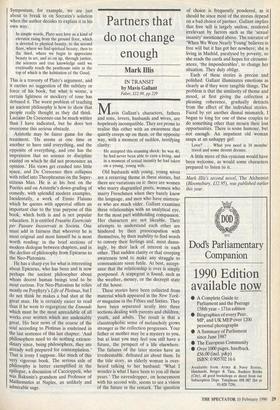Partners that do not change enough
Mark Illis
IN TRANSIT by Mavis Gallant Faber, £12.99, pp.229 Mavis Gallant's characters, fathers and sons, lovers, husbands and wives, are hopelessly incompatible. They are prone to realise this either with an awareness that quietly creeps up on them, or the opposite way, with a moment of sudden, terrifying clarity:
He accepted this stunning shock: he was 40, he had never been able to earn a living, and in a moment of sexual insanity he had taken on a young, young wife.
Old husbands with young, young wives are a recurring theme in these stories, but there are variations on it: there are women who marry disgruntled poets, women who marry Frenchmen when they barely know the language, and men who have mistress- es who are much older. Gallant examines these relationships with an analytical eye, for the most part withholding compassion. Her characters are not likeable. Their attempts to understand each other are hindered by their preoccupation with themselves, by their inability to find words to convey their feelings and, most damn- ingly, by their lack of interest in each other. That sudden clarity or that creeping awareness tend to make any struggle to communicate seem futile. At best, accept- ance that the relationship is over is simply postponed. A scapegoat is found, such as the weather, money, or the decrepit state of the house.
These stories have been collected from material which appeared in the New York- er magazine in the Fifties and Sixties. They have been separated neatly into three sections dealing with parents and children, youth, and adults. The result is that a claustrophobic sense of melancholy grows stronger as the collection progresses. Your father or mother may be a mystery to you, but at least you may feel you still have a future, the prospect of a life elsewhere. The failures of the later stories have an irredeemable, defeated air about them. In the title story, an elderly woman is over- heard talking to her husband: 'What I wonder is what I have been to you all these years.' The eavesdropper, on honeymoon with his second wife, seems to see a vision of the future in the remark. The question of choice is frequently pondered, as it should be since most of the stories depend on a bad choice of partner. Gallant implies that free will is largely useless, rendered irrelevant by factors such as the 'sexual insanity' mentioned above. The narrator of `When We Were Nearly Young' believes in free will but it has got her nowhere; she is living in Madrid, paralysed by poverty, so she reads the cards and hopes for circumst- ances, 'the imponderables', to change her situation. They duly oblige.
Each of these stories is precise and polished. Gallant illuminates emotions as clearly as if they were tangible things. The problem is that the similarity of theme and mood, at first giving the collection a pleasing coherence, gradually detracts from the effect of the individual stories. Faced by yet another dismal mismatch, I began to long for one of these couples to do something other than mourn their lost opportunities. There is some humour, but not enough. An impatient old woman snaps at an unhappy girl:
Love? . . . What you need is 18 months' travel and some decent dresses.
A little more of this cynicism would have been welcome, as would some characters prepared to listen to it.
Mark Illis's second novel, The Alchemist (Bloomsbury, £12.95), was published earlier this year.


















































 Previous page
Previous page